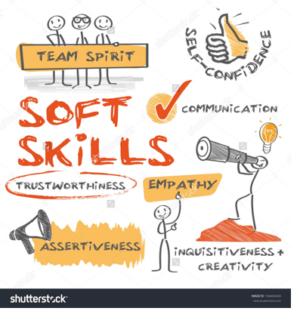By Dzigbordi KWAKU-DOSOO
In the modern workplace, the attributes that distinguish exemplary professionals are no longer confined to technical knowledge or industry-specific expertise.
As globalization and technological advancements redefine the boundaries of work, soft skills—the intangible yet pivotal traits that shape human interaction—have emerged as the cornerstone of professional success. Beyond their immediate utility, these skills possess a transformative power, fostering collaboration, innovation, and resilience across all levels of an organization.
The concept of soft skills transcends mere interpersonal niceties; it encompasses a wide spectrum of abilities, including effective communication, critical thinking, emotional intelligence, adaptability, and leadership.
These traits enable individuals not only to navigate the complexities of their roles but also to inspire and empower those around them. As organizations contend with an increasingly competitive and interconnected world, the need to prioritize and nurture soft skills has become an imperative rather than an option.
This article delves into the profound significance of soft skills in the modern workplace, exploring their role in enhancing productivity, fostering innovation, and cultivating a positive work culture.
Building on these insights, it offers actionable strategies for organizations and leaders to embed soft skills into their operational ethos, ensuring that their teams are equipped to excel in an ever-changing professional landscape.
The Interplay Between Soft Skills and Technology
The rise of automation and artificial intelligence (AI) has brought about a seismic shift in the nature of work. Tasks that once required technical prowess or manual labor are now being seamlessly executed by machines, leaving humans to focus on roles that demand creativity, empathy, and strategic thinking. In this evolving context, the value of soft skills has become increasingly pronounced.
While machines excel at precision and efficiency, they lack the nuanced understanding required for human interaction. For instance, a customer service chatbot may address routine queries, but it cannot replicate the empathy or problem-solving capabilities of a skilled representative. This distinction underscores the importance of interpersonal skills in roles where trust and connection are paramount.
According to the World Economic Forum’s “Future of Jobs” report, roles emphasizing emotional intelligence, leadership, and critical thinking will see the highest growth by 2030. Professionals equipped with these skills will not only thrive but also spearhead innovation, enabling organizations to navigate the complexities of the digital age.

Cultivating a Culture of Learning
A workplace culture that values continuous learning and development is essential for embedding soft skills into the organizational fabric. This culture begins with leadership.
Leaders who exemplify adaptability, empathy, and effective communication inspire their teams to mirror these qualities. Research by McKinsey & Company reveals that leaders who prioritize the development of interpersonal abilities within their teams report higher levels of engagement and productivity.
Organizations must move beyond traditional training approaches, embracing dynamic and interactive methods to teach soft skills. Workshops, role-playing exercises, and mentorship programs offer employees hands-on opportunities to refine their abilities. Furthermore, incorporating digital platforms and e-learning modules can ensure that learning remains accessible and scalable, catering to diverse teams across geographical boundaries.
To sustain this culture, organizations should celebrate incremental progress and provide constructive feedback. Recognizing employees who demonstrate exceptional soft skills reinforces their value and motivates others to follow suit.
Addressing the Challenges of Soft Skills Development
Despite their undeniable importance, soft skills remain underdeveloped in many workplaces due to several challenges. One of the most significant barriers is the perception that these skills are secondary to technical expertise. This misconception often stems from the traditional education system, which places greater emphasis on hard skills such as mathematics, coding, and engineering.
To counteract this bias, organizations must highlight the tangible benefits of soft skills, such as improved team dynamics, enhanced customer satisfaction, and increased innovation. Leaders can achieve this by sharing success stories, conducting impact analyses, and incorporating soft skills into performance evaluations.
Another challenge lies in the difficulty of measuring soft skills. Unlike technical abilities, which can be assessed through certifications or proficiency tests, soft skills are inherently subjective. However, modern tools such as 360-degree feedback, peer evaluations, and behavioral assessments provide valuable insights into an individual’s interpersonal strengths and areas for improvement.
Finally, fostering soft skills requires a supportive organizational culture. Employees must feel safe to experiment with new behaviors, make mistakes, and seek feedback without fear of judgment. By promoting psychological safety and open communication, organizations can create an environment where soft skills flourish.
The Transformative Power of Emotional Intelligence
Among the many facets of soft skills, emotional intelligence (EI) stands out as a particularly transformative trait. Defined as the ability to recognize, understand, and manage one’s emotions while empathizing with others, EI is a critical driver of leadership effectiveness and team cohesion.
Daniel Goleman, a renowned psychologist and author, identifies five key components of emotional intelligence: self-awareness, self-regulation, motivation, empathy, and social skills. Leaders who exhibit high emotional intelligence are better equipped to navigate conflict, inspire trust, and foster collaboration. Moreover, they can adapt to diverse personalities and cultural contexts, enabling them to lead inclusively in a globalized workplace.
Organizations can nurture emotional intelligence through targeted training programs, mindfulness practices, and regular self-reflection exercises. Encouraging employees to engage in activities such as journaling, meditation, and active listening can significantly enhance their emotional awareness and interpersonal skills.











